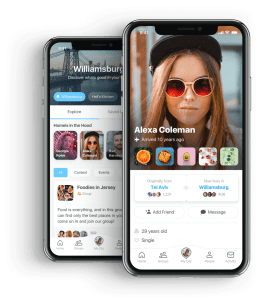[vc_row][vc_column]
There is nothing easy about the immigrant experience. No matter what country one decides to put down new roots, the process of cultivating the ground to ensure growth and life is possible takes hard work. On top of that, the complications of a pandemic has left a lot of the world’s immigrant population working through overwhelming uncertainty. CEO and Co-Founder of social networking application Homeis, Ran Harnevo, is improving the lives of immigrants around the world by bringing the feeling of home, to their fingertips.
When Harnevo arrived in the United States in 2008, he identified a problem in the under representation and lacking resources available for immigrant populations. “Through this realization I was inspired to create a solution and in 2017 I co-founded Homeis, a platform with a unique mission to build a better internet for immigrants,” said Harnevo.
An application built by immigrants for immigrants, Homeis launched in Canada earlier this month to cater to the immigrant community. After successfully rolling out in India, Nepal, Bangladesh, Pakistan and Sri Lanka all within the last 30 days, there is no ceiling in site.


In the three years since launching, Homeis has created an ecosystem of community, mentorship and resources that has positively changed the experiences of over 300 million users. Something that Harnevo says has been essential to many during the coronavirus pandemic.
“In the U.S. the Trump administration has been putting huge legal obstacles in front of immigrants and trying to make their lives even more difficult rather than offering them any additional support,” said Harnevo, “The Homeis communities provide a network of support, access to information, and dozens of legal, medical and financial experts and services for our users. Since the crisis started, we experienced an increase of 300% in our daily activity.”
As documentation of the unsettling realities faced by immigrants, documented and undocumented, in isolation continues to make news, the Homeis platform creates a lifeline of connection.
For this week’s Start-Up Spotlight, Bay Street Bull spoke with Ran Harnevo about his journey as a serial entrepreneur, how he hopes to cultivate a better community for immigrants, and world domination.
[vc_text_separator title=”Q & A”][vc_separator][vc_column_text]
What unique functions does Homeis have that caters to the immigrant population and experience that cannot be found in basic networks like Facebook and Twitter?
Homeis caters to helping the immigrant population bring their two homes together. We help immigrants find their wings in their new homes, without losing their roots. The app offers resources that cannot easily be found in networks like Facebook and Twitter. In one central place online, users can search for jobs and places to live. They can make connections and relationships with people who share the same homeland and live nearby. They can also look for legal advice and recommendations on everything from trusted immigration lawyers and doctors to the best restaurants serving the most authentic dishes – and all this information is available in their native language. Unlike basic networks that are more fragmented, we gather these recommendations and capabilities in one place.
Finding a community after moving to a new country is difficult and can be the difference between a positive and negative experience. What gaps in government support is Homeis filling?
In the U.S., we can see that discrimination comes from the administration, and this is why so many immigrants are considering leaving the U.S. and moving to immigrant-friendly Canada. For example, pandemic-related unemployment and the sudden loss of income has been disproportionately difficult for working-class immigrants and undocumented workers in the U.S. and Canada. In the U.S., though many immigrant workers paid taxes, they are not eligible for relief like Trump stimulus aid, food stamps and unemployment benefits because of their citizenship status. Many of them are not eligible to vote, so in an election year, they are hardly a priority for politicians.
There is also a shocking lack of support from big tech CEOs even though foreign tech workers are the backbone of our largest tech leaders such as Apple, Facebook and Google. These giants have been shamefully slow to respond to the chaos Trump created for foreign-born workers and their families with his visa regulations.
The pandemic has created unique challenges for immigrants. To us, this indicates the lack of governmental support and access to information and resources: in a time of crisis, immigrants turn back to their communities for support. Homeis now serves as a voice for our app’s user base of 300 million immigrants across the U.S., Canada and the world. We offer a safe space for immigrants to ask how the pandemic impacts their specific circumstances and visa status, and the number of foreign-born people looking for help and guidance on the platform has skyrocketed: our daily usage spiked with half a million visits, up more than 300% since early March.

How has this functioned during COVID-19?
During COVID-19, the platform saw a user increase of about 20% as the virus spread globally. Questions like “where can an undocumented immigrant get tested for COVID-19?” or “I’m here on the H1B visa and have 60 days to find a new job, what should I do?” increased heavily in volume. And since March, there has been increased traction on the topic of immigrating to Canada and an interest in virtual information sessions with immigration lawyers and experts.
Since March, Homeis has become a place where our users find and share vital content such as local news, legal help and financial information, in their native language. Users form discussion and volunteer groups to assist their community members. We can clearly see the users taking advantage of the platform as a space for community aid.
There are many ways to launch an app and move from ideation to execution. How did you go about creating Homeis? What is your five year goal for Homeis and how do you and your team hope to see it evolve?
The internet has always been broken for immigrants. As an immigrant myself, I simply created the tool I wish I had during my move here. The company was founded in February of 2017 in New York City and Tel Aviv and came to life rapidly. So much of that has to do with our users. We launched our first community in January of 2018 and now have nearly 1 million users. We’d like to continue to expand globally in the next five years and, like most foreign born people, we are BIG dreamers.
What do you believe sustains a business?
Pinpointing and fulfilling a need of a group, and staying on top of that need as it evolves (e.g. keeping up with the needs of immigrants in the ever-changing U.S. immigration landscape).
What is an essential lesson that you learned that you put forward in your business strategy?
Like a typical Israeli, I joined the army when I was 18 years old. I left home and found myself in the most challenging environment a high school graduate can find themselves in. I think that for me, and honestly to a lot of Israeli entrepreneurs, the army was an early and super meaningful lesson in resilience. After serving for over seven years, I left the army fearless. It helped me a lot with strategizing in the uncertainty of the startup world.
No career is linear. When was a difficult time along your journey that you can appreciate now as being transformative?
After Aol, I tried to create a startup in the music space. Our belief was that artists have to go direct-to-consumer and find a path to bypass the big tech giants who steal their data. I still believe in the need for a start up like this, but this particular venture failed. It raised a lot of money but didn’t have the right DNA from the get go. After winning so massively prior to creating this startup, there was something so shocking in its failure, even though most startups fail. It was a good lesson in humility for me, but the failure burned. It was hard to digest. In hindsight it was one of the most insightful periods of my professional life and eventually led me to where I am today.
Homeis is now launching in Canada. What can users expect? Are there any features that will assist Canadian immigrants as they navigate their experience? In a COVID-19 world, what resources can Canadian immigrant users find curated on the app?
We’ve just launched our first Canadian digital platforms for South Asian immigrants from India, Nepal, Bangladesh, Pakistan and Sri Lanka. Users can expect to exchange messages with people who volunteer their time to help new app users find services, classes or jobs that they might be interested in, meet other members from that same community, attend Homeis hosted events in their cities or even advertise small businesses. The Homeis front page has a constantly updated series of posts related to the concerns of that particular community, as well as links for chats with immigration lawyers, therapists and, now, doctors. All features are adapted and curated for the local communities in Canada.
Every Start-Up aspires to achieve growth and successful scaling. Homeis is now expanding globally into various countries. How are you managing this growth and what advice would you give to other small companies with big aspirations?
We’re building off past successful community launches and expanding our team wherever necessary to meet demand. The key is to build a team that wants to see the growth of your business as much as you do. For example, all of us on the Homeis team live in the foreign-born communities we serve in real life. That’s rare and I appreciate it dearly.
For small companies, having the right team members is everything. How do you approach looking for new talent and what do you believe makes a great employee?
Many Homeis team members are foreign-born themselves. They can identify and use the app in their own daily life, finding areas of growth right at the source as their own needs as users change. We’re a company of immigrants, committed to what we’re doing.
How do you define positive leadership?
Leadership comes naturally and purposefully when acting for change. Always keep yourself in the weeds to be able to effectively address new needs that surface.[/vc_column_text][/vc_column][/vc_row]













